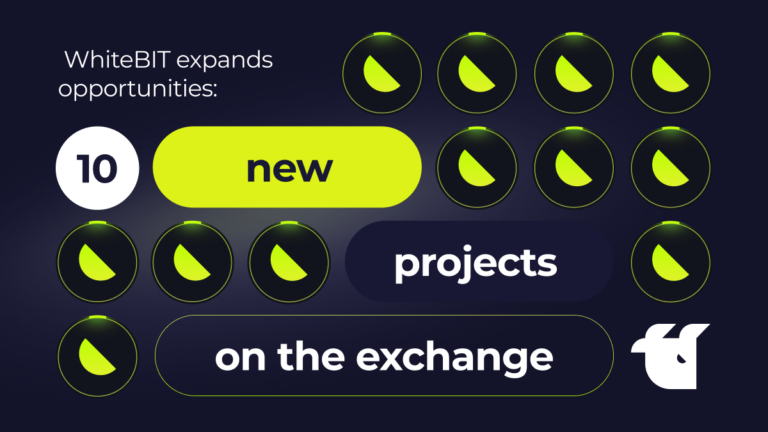Crypto Asset Management for Institutional Investors: Emergence of Institutional Crypto Custody Services

Content
- Rise of Cryptocurrencies and Their Growing Popularity Among Institutional Investors
- Institutional Adoption of Cryptocurrency
- Importance of Crypto Asset Management for Institutional Investors
- Challenges in Institutional Investment in Crypto
- Opportunities in Institutional Crypto Investing
- Best Practices of Managing Crypto Assets for Institutions
- Institutional Crypto Custody by WhiteBIT
- Conclusion
While retail crypto investors revel in the freedom and decentralization of the digital assets’ realm, crypto solutions for institutional investors and businesses remain unexplored.
Despite this sphere being out of attention, the institutions’ interest in cryptocurrencies keeps growing.
According to the PwC 2023 Report, the percentage of traditional hedge funds venturing into the world of crypto assets has shown a slight decrease, dropping from 37% in 2022 to 29%. However, what truly captures attention is the depth of their commitment. Average Assets Under Management allocated to cryptocurrencies have significantly surged, leaping from 4% to 7%.
What’s even more riveting is the forward-looking sentiment these institutional giants harbor. The majority have no plans to retract their steps; over half aim to sustain their current crypto investments, while an optimistic remainder envisions amplifying their capital deployment into this arena by the close of 2023.
Amid the array of available options, every business embarks into the crypto sphere on a common starting point — selecting the strategy to store and manage their crypto assets. In this article, we delve into the topic of crypto asset management for institutions.
Rise of Cryptocurrencies and Their Growing Popularity Among Institutional Investors
From being an obscure concept discussed within niche tech circles to becoming a global financial phenomenon, crypto has carved its niche. By 2021, global adoption of cryptocurrencies, as indicated by Chainalysis’s Global Crypto Adoption Index, had grown by 2300% compared to only 2019, with peer-to-peer platforms and cryptocurrency transactions becoming more prevalent, especially in regions like East Asia, Central & Southern Asia, and Africa.
This rise has been accompanied by the growing popularity of crypto among institutional investors, driven by potential high returns, diversification opportunities, and the allure of being part of a novel financial ecosystem. In 2020, a survey by Fidelity Investments revealed that 36% of institutional investors were actively investing in digital assets. Among those U.S. and European investors surveyed with current digital asset exposure, over 60% directly purchased digital assets.
Traditional finance giants are also joining the sphere. BlackRock, which recently filed for a Bitcoin ETF, and JPMorgan’s digital coin, JPM Coin, which has already processed $300 billion in transactions since 2019, attest to this institutional pivot and underscores the institutional trust and growing interest in crypto-assets.
Institutional Adoption of Cryptocurrency
Institutional crypto adoption is not just a buzzword but a reality shaping today’s financial markets. Major institutional investors, like BlackRock, increasingly incorporate cryptocurrencies into their portfolios thanks to the institutional crypto custody services.
Factors driving this include crypto’s potential to hedge against traditional market volatility and unlock unique investment opportunities in instruments other than conventional asset classes.
Importance of Crypto Asset Management for Institutional Investors
With the increasing institutional adoption of crypto, the need for dedicated crypto asset management for institutions has grown exponentially. Proper management ensures that these large-scale investors can efficiently capitalize on the potential advantages of crypto for institutional investors while minimizing risks.
Effective asset management can provide institutional investors with:
- Enhanced portfolio diversification;
- Real-time asset tracking and valuation;
- Customized risk management solutions;
- Regulatory compliance;
- Seamless integration with traditional investment tools.
Challenges in Institutional Investment in Crypto
While the opportunities seem lucrative, there are notable still challenges in the realm of crypto for institutions.
Regulatory Uncertainty and Compliance Issues
Besides the overarching regulatory uncertainties, institutions also face challenges in adhering to specific compliance protocols, notably KYC, KYB, and AML measures. As the cryptocurrency space matures and attracts more institutional participants, compliance with these established financial safeguards becomes vital.
Moreover, the taxation of cryptocurrencies adds another layer of complexity. Different jurisdictions treat cryptocurrency gains differently, ranging from viewing them as property, currency, or even commodities.
Security Concerns and Risk Management
The decentralized and digital nature of crypto means that security concerns, like hacking and unauthorized access, are real. Institutional investors with large volumes of assets require fortified security measures.
This is where services like institutional crypto custody become pivotal, ensuring assets’ safety and mitigating potential risks.
Lack of Institutional-Grade Infrastructure
Though the crypto ecosystem has matured, there’s a need for a more robust, institutional-grade infrastructure. From trading platforms to reporting tools, institutions require specialized solutions tailored to their needs to capitalize on the crypto for institutional investors trend.
Lack of Custodians Providing Added Value
Beyond mere custody, which, though foundational, has become a standard offering, institutions today demand added value in their crypto ventures. This takes the form of both traditional financial services adapted for the crypto realm and novel opportunities unique to the decentralized space. Some examples of additional services include passive income opportunities, tax optimization and reporting, institutional-grade trading platforms, etc.
Opportunities in Institutional Crypto Investing
As the wave of institutional interest in crypto expands, the array of opportunities for these high-tier investors has become varied and impactful. It’s no longer just about acquiring Bitcoin or Ethereum; the crypto world now offers a rich palette of investment avenues.
Portfolio Diversification and Potential for High Returns
Arguably, the primary attraction for institutional investors in crypto lies in the potential for portfolio diversification. Traditional assets like stocks and bonds have volatility metrics, often correlated with broader economic factors.
In contrast, crypto assets provide a different set of risk-reward profiles. This means that when incorporated judiciously into a diversified portfolio, they can potentially offset losses in other asset classes, ensuring robust overall returns.
Access to Innovative Investment Products
With the growing institutional investment in crypto, there’s a corresponding rise in innovative financial products tailored to sophisticated investors. These products include crypto-based derivatives, staking opportunities, decentralized finance (DeFi) platforms, and beyond.
Such products can offer institutional crypto investors unique ways to enhance yields and leverage their positions in the market.
Market Liquidity and Trading Opportunities
The entry of institutions in crypto has significantly enhanced market liquidity. A liquid market ensures that large volumes of assets can be bought or sold without causing drastic price changes.
This, coupled with crypto’s inherent volatility, provides fertile ground for trading opportunities, potentially allowing institutional investors to capitalize on short-term price movements.
Best Practices of Managing Crypto Assets for Institutions
With the opportunities come responsibilities. Effective management is paramount, given the sheer volume of institutional money in crypto. Here are some recommended best practices:
Due Diligence and Research
Before embarking on any investment journey, conducting meticulous research is an absolute imperative. The realm of crypto institutional investment is no exception. In light of the ever-evolving landscape, institutional investors are compelled to consistently refine their expertise, evaluate prevailing market dynamics, and meticulously appraise potential assets or investment instruments.
Risk Management Strategies
Crypto, for all its potential, remains a volatile asset class. Hence, it’s imperative to have a robust risk management strategy in place. Whether setting Stop-Loss orders, diversifying crypto holdings, or hedging positions using crypto derivatives, the goal is to protect the portfolio from adverse market movements.
Partnering with Experienced Service Providers
One of the vital aspects of navigating the crypto waters is choosing the right partners. Whether it’s a platform for trading, a service for institutional crypto custody, or a consulting agency specializing in blockchain, the expertise of these service providers can make a significant difference. When selecting these partners, institutions must prioritize reliability, security, and a proven track record.
As cryptocurrency institutional investors deepen their foothold, they must balance seizing opportunities and managing potential risks. With the right strategies and partners in place, the crypto realm can offer unparalleled advantages to the institutional investing world.
Institutional Crypto Custody by WhiteBIT
WhiteBIT provides a full range of institutional services for corporate clients. The company serves over 1,000 institutional clients and has an average daily trading volume nearing $500 million. The platform’s emphasis is not merely on transactional exchanges but on building a holistic ecosystem tailored to various institutional needs.
What’s an Institutional Crypto Custody Solution
WhiteBIT has curated a suite of tools for institutions:
- The Custody Service focuses on transactional integrity, backed by AML checks and the generation of distinct wallet addresses.
- The Merchant Portal is structured for large-scale operations, enabling batch payments to numerous wallets or cards and facilitating detailed transaction reports.
- The platform’s API offerings, spanning from REST API to real-time WebSocket and FIX protocol support, are geared towards efficient trading experiences. An automated custodial service, leveraging Rest API and WebHook, intends to ease the deposit and withdrawal processes.
- The Crypto Lending feature is structured to offer up to 18.64% annually in passive income, reminiscent of traditional banking mechanisms.
Additionally, WhiteBIT’s client support emphasizes personalized assistance. This approach includes assigning an account manager to each client and offering multilingual support.
WhiteBIT’s Security
Security is a strong focus for WhiteBIT. Measures such as keeping 96% of digital assets in cold wallets, utilizing advanced WAF technologies, and ensuring compliance with international security norms (FATF) highlight their security-centric approach.
The CER.live certification platform and Hacken.io, a leading specialist in services of cybersecurity in blockchain technologies, have audited WhiteBIT. According to audits, WhiteBIT meets the highest security requirements and is one of the top three centralized exchanges in terms of reliability, with the highest AAA rating.
Conclusion
The trajectory of institutional crypto investment is unmistakable. However, there is a lack of platforms providing robust infrastructure; basic storage and management features are no longer sufficient to meet institutional needs.
Today, institutions are actively seeking custodial solutions that go beyond the basics and provide added value. Offerings such as WhiteBIT’s Institutional Crypto Custody exemplify the market’s readiness to serve these high-volume participants.
As the cryptocurrency market evolves, the mix of institutional capabilities and solutions will determine the depth and sustainability of institutional investor participation.
FAQ
The exact amount of institutional money in crypto is hard to find out because of the volatile and rapidly evolving nature of the market. Additionally, while some institutions announce their cryptocurrency acquisitions, many don't disclose specifics, making precise calculations difficult. However, recent insights can shed some light on the situation.
According to the PwC 2023 Report, the participation rate of traditional hedge funds in crypto assets has declined from 37% in 2022 to 29% in 2023. Yet, the depth of their engagement paints a telling picture: the average Assets Under Management (AUM) allocated to cryptocurrencies has increased from 4% to 7% within that timeframe.
Thus, while we might not have an exact dollar figure, the rising percentage of AUM indicates a growing and substantial institutional financial presence in the crypto sector.
According to the EY 2023 report, institutional investors' primary crypto holdings are notably centered around spot cryptocurrencies, particularly Bitcoin (BTC) and Ethereum (ETH). However, it's essential to highlight that a significant 60% of these institutions, while holding positions in BTC and ETH, have diversified to include other cryptocurrencies in their portfolios.
Beyond these well-recognized assets, there's a rising institutional interest in tokenized private funds and securities like bonds and stocks. This aspiration is driven by the allure of accessing new asset classes, coupled with promises of heightened liquidity and transparency. Furthermore, a remarkable 47% of hedge funds and institutional asset managers are eyeing the tokenization of their assets.
While BTC and ETH remain foundational to institutional crypto portfolios, there's an evident diversification push, embracing both newer cryptocurrencies and tokenized traditional assets.








